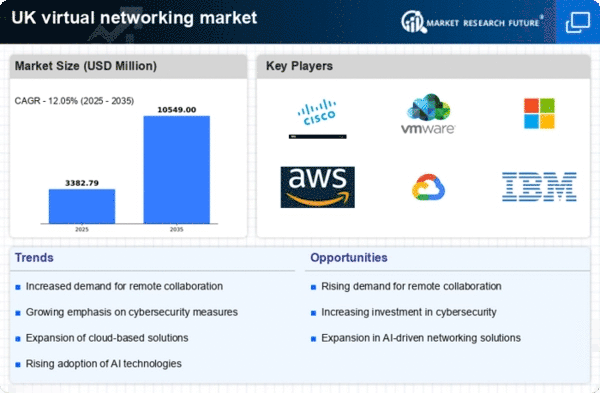Growing Cybersecurity Concerns
Cybersecurity remains a critical concern for businesses in the UK, significantly impacting the virtual networking market. With the rise in cyber threats, companies are increasingly prioritising secure networking solutions to protect sensitive data. Recent statistics indicate that cyberattacks have risen by over 30% in the past year, prompting organisations to invest heavily in cybersecurity measures. This heightened focus on security is driving demand for virtual networking solutions that offer advanced encryption, secure access controls, and comprehensive monitoring capabilities. The virtual networking market is thus evolving to meet these challenges, with providers developing innovative solutions that not only enhance connectivity but also fortify security, ensuring that businesses can operate safely in an increasingly digital landscape.
Emergence of Collaborative Tools
The rise of collaborative tools is significantly influencing the virtual networking market in the UK. As organisations increasingly recognise the importance of teamwork and collaboration, there is a growing demand for networking solutions that integrate seamlessly with collaborative platforms. Recent surveys indicate that over 70% of UK businesses are investing in tools that enhance team collaboration, driving the need for virtual networking solutions that support these initiatives. The virtual networking market is adapting to this trend by developing solutions that not only provide connectivity but also enhance collaborative experiences, enabling teams to work together more effectively, regardless of their physical locations.
Increased Focus on Cost Efficiency
Cost efficiency is becoming a driving force in the virtual networking market within the UK. As businesses strive to optimise their operational expenses, many are turning to virtual networking solutions that offer scalable and cost-effective alternatives to traditional networking methods. Recent analyses indicate that companies can reduce their networking costs by up to 40% by adopting virtual solutions. This trend is particularly appealing to small and medium-sized enterprises (SMEs) that may have limited budgets. The virtual networking market is responding to this demand by providing flexible pricing models and solutions that cater to the financial constraints of various businesses, thereby facilitating broader adoption of virtual networking technologies.
Advancements in Network Infrastructure
The virtual networking market in the UK is benefiting from significant advancements in network infrastructure. The rollout of high-speed broadband and 5G technology is transforming how businesses connect and communicate. With faster and more reliable internet connections, companies are able to leverage virtual networking solutions that enhance collaboration and efficiency. Recent reports suggest that the adoption of 5G technology could increase network speeds by up to 100 times, providing a substantial boost to the virtual networking market. This technological evolution is likely to encourage more businesses to adopt virtual networking solutions, as they seek to capitalise on the benefits of improved connectivity and reduced latency.
Increased Demand for Remote Work Solutions
The virtual networking market in the UK is experiencing a surge in demand for remote work solutions. As businesses increasingly adopt flexible work arrangements, the need for robust virtual networking tools has become paramount. According to recent data, approximately 60% of UK companies have implemented remote work policies, driving the necessity for secure and efficient networking solutions. This trend is likely to continue, as employees seek seamless connectivity and collaboration tools that facilitate productivity from any location. The virtual networking market is thus positioned to benefit from this shift, with companies investing in technologies that enhance remote work capabilities, ensuring that employees remain connected and engaged regardless of their physical location.
















